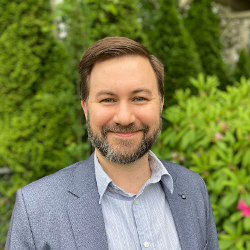It was an honor to serve as a 2023/2024 Emanuel Fellow. With the support of the Consortium, I was able to make headway on my manuscript on the history of marine introduced species. Along the way, I developed relationships with archivists far and wide and disseminated research to a larger audience. As an independent scholar, much of this would have been impossible if not for the generosity of the Consortium.
Unearthing sources on the global movement of marine species required visits to archives in the greater London area and Amsterdam. As epicenters of early modern trade, these cities witnessed species coming and going and are thus home to records that shed light on these transfers. I’m grateful for the support from the staffs at the National Archives in Kew, Caird Library, British Museum, and the National Maritime Museum in Amsterdam. They enthusiastically helped me track down sources for such an unusual topic. Some of the most promising sources that I discovered involved efforts to thwart ship degradation by wood-boring species thought to come from abroad. English navigators, for instance, in their efforts to slow the gnawing of woodborers on their hulls, often remarked on the origins of various species. These became useful clues to map the biogeography of itinerant species, many of which have obscured their places of nativity from modern marine biologists. While these anecdotes are hardly conclusive, they will be of interest to marine biogeographers who have in recent years valued these types of qualitative sources. As a historian, I was especially interested in how introduced species shaped human experiences with the sea. As a proponent of the burgeoning field of maritime ecology, I used Emanuel funds to shine a light on working people at sea and how they indirectly conceptualized introduced species in their efforts to keep their ships and dikes afloat and standing, respectively. One of the more fascinating troves of records unearthed in London involves the market for woodborer resistant materials and compounds. I had not anticipated such a vibrant discourse stretching back to the 1600s (it is something I’ve tracked in the late nineteenth and early twentieth centuries). It is through these letters that we can triangulate introduced species as they spread throughout the globe and shed light on the mundane human experiences of this broader environmental change. People put their bodies at risk when they went to sea, so I wanted to be able to tell the history of introduced species through the lenses of real people, doing real work, in real places. The Emanuel fellowship allowed me the time and resources to begin to r construct this social and cultural history of biological transfers. While I had hoped to shed light on working people and how they experienced the spread of introduced woodborers, I did not anticipate unearthing sources by influential Europeans. For modern readers, terms like “woodborers” or “shipworms” are foreign. Yet, back in the early modern era, introduced species were no trifle. The likes of Sir Isaac Newton and his fellow English diplomats paid attention to introduced species, as I’ve found. During my research, I was surprised to see how observations of introduced species intersected with geopolitics and intelligence. To my surprise, how a ship was built—and especially a warship—were of interest to spies, who could use information about a ship’s woodborer deterrents as evidence of intentions of a foreign power. The bizarre geopolitics of introduced species in the early modern era will be new terrain for my eventual book. Over the past year, I have presented about my fellowship-funded discoveries at the annual conferences for the History of Science Society and the American Society for Environmental History. Early research from my time as a fellow appeared in a coauthored chapter published as part of the edited volume Maritime Animals: Ships, Species, Stories. My fellowship endeavors were validated by the History of Science Society, which awarded me the 2024 Edward Gerjuoy/John Michell Award at the annual conference in Mérida, Mexico. I’m grateful to the awards committee for their recognition and prize money to further new research.
Finally, I’m grateful to the Consortium staff for their support as I completed my fellowship, and also to the many Consortium fellows who offered valuable feedback on my work. |
 Derek Nelson is the 2023-2024 Consortium Emanuel Fellow.
Derek Nelson is the 2023-2024 Consortium Emanuel Fellow.